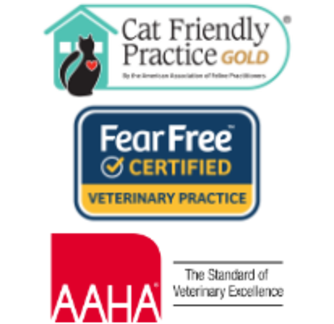Animal Hospital of Waynesville
Nutrition Services
We carry a variety of foods to meet all of your pet’s needs.

Our Healthy Advantage food contains vitamins E and C to help protect the immune system. It also helps prevent hairballs in cats and weight gain in cats and dogs, and helps keep teeth and gums healthy with kibble technology. It also contains omega fatty acids to promote healthy coat and skin.
We also carry an array of prescription diets targeting different individual needs. Some examples of these diets are C/D stress for feline urinary health, M/D or DM for diabetic patients, J/D for joint health and mobility, K/D for kidney support, and W/D for GI health. We are also able to special order foods if needed for pets with specific individual needs.
Obesity is also a major issue concerning our pets. We are happy to formulate a diet plan for your pet to help them achieve an ideal, healthy weight. Some examples of weight management diets are the Metabolic Diet, R/D and W/D.
Understanding Nutrition
How many times have you found yourself standing in the pet food isle amazed at all the choices of food: light, weight management, indoor formula, senior, hairball control, adult, active, puppy/kitten, and so-on? Every bag is so brightly colored showing a picture of a happy and healthy pet. With all the distractions, picking the best pet food can become quite the hassle. For most of us picking the cheapest bag constitutes the best choice. But what if you flipped the bag over and looked at the label, would you know what you are looking at? For most of us the answer would be no.
Getting Back to the Basics
6 Basic Nutrients Needed By All Animals
Proteins
Fats
Carbohydrates
Vitamins
Minerals
Water
Proteins, fats and carbohydrates are all energy producing.
Vitamins, minerals, and water are all non-energy producing.
What roles do proteins, fats, carbohydrates, vitamins, and minerals play in a pet’s life?
Proteins: The building blocks of all cells.
Fats: A good source of energy that can be stored for later use.
Carbohydrates: A quick, simple, easily absorbed energy source
Vitamins: Play a very essential role in every day metabolic activities.
Minerals: Very important in building and maintaining healthy bones, teeth and muscle function.
The GREATEST need is Water!
Out of all the nutrients water deprivation kills the quickest.
All living things have to have a constant intake of water.
Water plays a major role in the body.
A pet’s body is mostly water – 70-80%!
Energy Producing Nutrients
Protein, fats, and carbohydrates provide pets with the energy that they need for everyday living. The amount your pet may need depends on your pet’s activity level, environment, life stage, and/or individual needs. By gaining more knowledge about nutrients your pet gains a healthy and balanced diet.
Proteins
Proteins are continually being used for the body’s daily maintenance.
The requirement for proteins can increase with life changes such as: growth, performance, reproduction and illness.
Essential Amino Acids
Proteins are made of long chains of amino acids. Once in the body, proteins are broken down into small chains of amino acids and reassembled into needed proteins.
Essential amino acids are required for body growth and maintenance. When the body cannot make them, they must be given in the diet.
Example: Cats require more protein in their diet than dogs. (Cats are true carnivores and dogs are omnivores). Cats require an essential amino acid called taurine. The cat’s body cannot make taurine so therefore it must be supplemented into the diet. Taurine plays a very important role in healthy heart and eye function.
Protein is the most expensive nutrient in most diets. The higher the quality the higher the price BUT the higher the quality the less that is required (due to the body being able to absorb and use better).
Fats
The role of fats:
Surrounds and cushions vital organs
Stored fat acts as an insulator
Increases palatability
Aids in the absorption of vitamins A, D, E and K
Contains 3 times more energy than protein and carbohydrates
Essential Fatty Acids
Much like protein, fats are made up of long chains of fatty acids. Once in the body, the fats are broken down into smaller fatty acid chains and used as needed.
Essential fatty acids are required for everyday metabolism. When the body cannot make them, they must be given in the diet.
Example: Omega 3 and Omega 6 are both fatty acids that cannot be made by the body. Therefore it is crucial that they both be supplemented into the diet. Omega 3 and Omega 6 are both essential for brain and eye function as well as decreasing inflammation.
Carbohydrates
Carbohydrates are broken down into two groups: soluble and insoluble.
Soluble Carbohydrates:
Also called nonstructural and/or starch
Highest concentrations are found in plant seeds/grains (needed for germination and growth)
Easily digested
Can be used as a quick source of energy
In most pet foods starch is the main form of energy
Insoluble Carbohydrates :
Also called structural, fiber, roughage, and/or bulk
Highest concentrations are found in plant stems, leaves, and the wood of trees
Indigestible
Fiber is used to help bulk up a diet (commonly used in weight loss/control diets)
Can help regulate blood sugar levels
Can also be used to help treat diarrhea and constipation:
Helps absorbs water
Stimulates intestinal contractions
Helps regulate the amount of time it takes to pass food through the intestines
Hopefully learning a little more about the basic energy producing nutrients will help in the taunting task of selecting the right pet food.
Non-Energy Producing Nutrients
Even though they are not energy producing, vitamins, minerals and water are extremely important to pets. Everyone knows or at least has heard the important roles water plays: maintains body temperature; helps metabolize body fat; aids in digestion; lubricates and cushions vital organs; transports nutrients; and flushes toxins from the body. But do you know the different types of vitamins and minerals your pet needs? As well as the roles they play in supporting your pet’s life?
Vitamins
Essential for normal growth and development Do not provide energy but do help with the release of energy Cannot be made by the body, they must be obtained through the diet.
Help boost immune system.
Vitamins are divided into two groups: Fat Soluble and Water Soluble
Fat Soluble Vitamins
Vitamin A, D, E, and K
Must work in conjunction with fats in order to be used by the body.
Water Soluble Vitamins
Vitamins B1, B2, B3, B5, B9, B12, Choline, and C
Needs a regular intake of water in order for the body to use
Vitamin A
Helps maintain the skin and the mucus membranes
Helps support vision and growth
Important in reproduction
Tooth development
Found in liver, fish oils and dark yellow/orange plants
Gives the egg yolk the yellow color
Vitamin B1, B2, B3, B5, B6 and B12
All of these vitamins are used by the body in metabolizing proteins, fats and carbohydrates
They can be found in a number of places: whole grains, organ meat, fish, egg yolks, brewers yeast, leafy greens, oilseeds, and some nuts
Vitamin B9
Helps in the formation of amino acids and DNA
Found in organ meat, egg yolks, leafy greens, and also be formed by the bacteria in the intestines
Choline
Not a true vitamin but acts as one in the body
A very important part of the cell wall structure
Found in egg yolks, organ meats, legumes, and whole grains
Vitamin C
Functions as an antioxidant
The body of most pets (expect guinea pigs) can make vitamin C
Guinea pigs must be supplemented
Vitamin D
Increases the amount of calcium and phosphorus absorbed from the intestines
Regulates the use of calcium
Helps move calcium out of the bones to other needed places
Helps keep phosphorus within the kidneys
Found in: marine fish, fish oils, egg yolks, beef, and liver
Vitamin E
Used as an antioxidant in pet foods
Highest concentrations found in green leaves
Found in vegetable oils and grains
Vitamin K
VERY essential in a pet’s ability to produce and use clotting factors
Found in leafy green plants
Can be made by the bacteria that live in the large intestines
Can also be synthetic
Minerals
Required by all living organisms to maintain optimal health.Essential for metabolic processes.
Help maintain digestive liquids and fluids that surround cells.
Minerals that are meat origin are more easily digested than minerals that are plant origin.
Minerals are divided into three main classes: Macrominerals, microminerals, and trace elements (we will only cover the first two)
Macrominerals
Calcium
Most abundant mineral in the body
Gives the structural support to the skeleton (99% of the body’s calcium is found there)
For optimal bone growth diets must have a balanced ratio of calcium, phosphorus and magnesium
The easiest form of calcium that they body can absorb is in bone meal
Phosphorus
Second most abundant mineral in the body
Acts in ratio with calcium in bone structure
Also helps with the formation of RNA and DNA and cell membranes
High concentrations are found in meats and eggs
Magnesium
Third most abundant mineral in the body
Helps metabolize carbohydrates
Found in bone meal, oilseeds and fibers
Sodium and Chloride
MAJOR electrolytes in the body
Play a role in maintaining osmotic pressure, regulating acids, transmitting nerve impulses and in muscle contractions
Microminerals
Iron
Helps in the transportation of oxygen through out the body
Found in organ meat, beet pulp, soymill run and peanut hulls
Zinc
Plays a very important role in the metabolizing energy producing nutrients
Helps support healthy immune function and skin
Found in meats and fiber
Copper
Aids in the absorption of iron and the formation of some amino acids
Stored in the liver
Selenium
Works together with vitamin E to help protect cells from damage
Not as important for dogs and cats as it is for grazing animals
Iodine
Very important in helping the thyroid glands produce the normal amount of thyroid hormone
Found in fish, eggs and iodized salts
One last “take home” note is that all animals require nutrients NOT ingredients
DID YOU KNOW?…Facts About Feeding Your Pets
Finding the best food for your pet that provides the right amount of protein, fats, carbohydrates, minerals and vitamins is key. A well balanced diet is very important for your pet to live a long and healthy life. Now that you have the knowledge and the basic understanding of nutrition, go out and face the “monster” that is the pet food aisle. But before you do, here is some extra “ammo” to help you out.
DID YOU KNOW?…
Vegetables are a great source of many vitamins, minerals and amino acids.
Soy products are a wonderful source of a high quality protein.
“All life stages” labeled food may contain too much fat and sodium for adult and senior pets.
Corn is an all natural ingredient that supplies essential fatty acids, proteins, carbohydrates, and antioxidants.
Corn is NOT a filler. (A filler is an ingredient that provides no nutrition.)
Corn is NOT a common source of food allergies.
Dogs are omnivores and cats are carnivores.
Cats require more protein than dogs. They also require taurine in their diet.
Puppies and kittens need to be fed a diet that is specifically made for growth. Feeding a high quality diet ensures normal, healthy development.
Large breed puppies require a lower level of calcium and fat.
Poor quality food can lead to skin/coat issues, lack of energy, slow growth, skeletal deformities, pot-belly appearance, excessive gas, and smelly stool.
You need to feed puppy/kitten food till 1 year of age. This is when most pets reach their weight maturity.
Body condition score (BCS) is very important in telling if a pet is or is becoming overweight.
When feeding your adult dog, make sure the diet is intended for adult maintenance.
When feeding senior pets (pets that are 6 or older) remember that metabolism and activity levels slow down.
With senior pets it is best to feed a diet that is highly digestible, lower in calories, has high quality proteins, and lower levels of sodium and potassium.
Some senior pet food may have added supplements, such as glucosamine and chondroitin, to help with joint issues.
As pets age their nutritional needs change. They may need a more therapeutic diet.
Therapeutic diets are diets that are designed to help manage a disease/health issue (diabetes, heart, obesity, liver, kidney, joint, brain, oral health, and urinary).
Foods that have been labeled “organic” must be certified by the USDA.
“By-products” can be wholesome ingredients. A “by-product” is a product produced in the making or breakdown of another product.
“By-products” can include highly nutritious organ meat such as liver, kidney, and the heart. These are highly palatable and beneficial to pets.
“By-products are common in both human and pet food. Vitamin E is a “by-product” of soybeans found in both human and pet food.
Canned food contains 70-85% moisture.
Semi-moist foods are preserved by sugar therefore they are full of excessive sugar.
Some treats/snacks are nutritionally complete (could be used as the sole diet). It is strongly suggested that they be less than 10% of the daily caloric intake.
Daily caloric intake depends on your pet’s activity level, life style, age, breed and health status.
Did you also know?…
That at anytime you have any questions regarding nutrition you can call the Animal Hospital of Waynesville.
The Animal Hospital of Waynesville also offers nutritional consults with a Registered Veterinary Technician – Amanda Garrett
Whether you have a cat or a dog, nutrition is the most important key in keeping your pet healthy.

